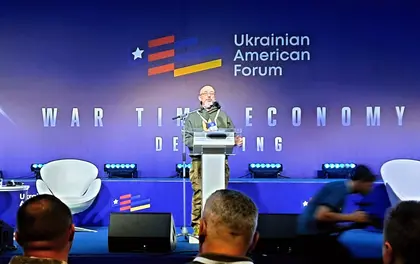The Ukrainian-American Forum held its inaugural conference in Kyiv on May 19 bringing together influential individuals from Ukraine and the United States to foster dialogue, collaboration, and partnership directed at the reconstruction of Ukraine. The afternoon session of the conference considered issues relating to the clearance of the widespread landmines and explosive remnants of war (ERW) contamination on Ukrainian territory.
The session was opened and moderated by Daniel Rice, president of the American University Kyiv (AUK), who has served as Special Advisor to General Valeriy Zaluzhny, the Commander in Chief of the Ukraine Armed Forces.
JOIN US ON TELEGRAM
Follow our coverage of the war on the @Kyivpost_official.
After a preliminary description of the purpose of the session, Rice introduced the keynote speaker, Oleksii Reznikov the Ukraine’s Defense Minister.
In a quiet, “lawyerly”, yet forthright delivery, the minister gave an overview of the current situation facing his country in its war against Russia, his hopes for NATO membership and the huge challenges facing them in the future because of contamination by landmines and unexploded ordnance.
He spoke about how Ukraine had been conscious of the threat Russia posed ever since its initial invasions in 2014, when it became obvious that Russia was intent on trying to recover its lost empire, with 80% of Russians thinking they should occupy Poland and 40% the Baltic States. Unfortunately, NATO countries had not been as focused on the threat during that period but have now, belatedly, woken up to a need to strengthen its defenses. He said: "The existing procedures of NATO are logical and correct [for peacetime], but not for war.”

Trump Comments Calling for Kremlin Concessions Ignites Firestorm of Russian Objections
Reznikov emphasized that Ukraine was making great progress in its war with Russia but also at great cost in people and other resources. Ukraine’s armed forces had been expanded from 260,000 to almost 1 million in response to Russia’s aggression. He used a particular statistic, which he felt showed both the success Ukraine was having but the challenges that were still faced: "According to our calculations, the Russians used to use up to 60,000 projectiles of different calibers against Ukrainians, day and night. As of today, they are using 25-30,000 projectiles of different calibers per day. It is still a lot."
The minister said that while Ukraine was not expecting definitive agreement for immediate membership of the Alliance, at the July Heads of State meeting, in Vilnius, Ukraine was receiving strong indication that it was just a matter of time. Many nations feel Ukraine is already a de facto member, fighting and winning a war that protects the west.
“Today Ukraine is fulfilling the function of NATO by destroying the capacity for aggression by the Russian Empire.”
He went on to say that Ukraine could no longer simply accept assurances, such as the 1994 Budapest memorandum, for its future protection. He said that NATO membership was the only way forward, for both Ukraine and the Alliance.
While thanking Ukraine’s western partners, in particular the US, for their continuing support Reznikov said that Ukraine was intent on developing their own economic and defense capabilities in the long term. Even now, Ukraine was sourcing much of its basic defense equipment, such as uniforms, boots and even body armor, domestically, but he was hoping that Ukrainian business would seek investors from the US and elsewhere who would understand that ‘Made in Ukraine’ was a sign of quality and innovation.
The minister then went on to talk about the extent of the landmine and ERW contamination facing Ukraine. Current estimates put the land area affected as around 160,000 square kilometers and around 400,000 square kilometers in the Black Sea and the Sea of Azov. This made Ukraine the most polluted country in the world. He compared this with the level of contamination faced by Croatia [13,000 square kilometers] whose clearance operations had been running for nearly 28 years, with a further 5 years of work still to go.
While Ukraine was doing all that it could to resolve the problems of mines, through its support of the State Emergency Service of Ukraine (SESU), the Ministry of Defense (MoD) and other relevant Ministries. Ukraine will need international support to provide the resources necessary to solve the demining equipment, training and international deminers.
His intervention ended with a short question and answer session which addressed demands by the Ministry of Agriculture for faster clearance of land, the need to ensure that those involved in demining were suitably trained and certified, Ukraine defense forces were working hard to achieve NATO standards in advance of accession, the need to clear the waters around ports, such as Odesa (for which the UK, Netherlands and Belgium were already providing specialist equipment, the improvements that had been made to provide secure and reliable conventional and internet-based communications for the defense forces.
The Minister ended his speech to a huge round of applause before handing back to President Rice for the next, technical phase of the session.
Other speakers at this important event included Deputy Prime Minister for Restoration -Oleksandr Kubrakov, Kyiv Mayor - Vitaliy Klitschko, Minister of Strategic Industries – Oleksandr Kamyshin, Head of the Mykolaiv Regional Administration – Vitalii Kim, former US Special Envoy for Ukraine – Kurt Volker, and many other Ukrainian and American business and military representatives.
You can also highlight the text and press Ctrl + Enter










